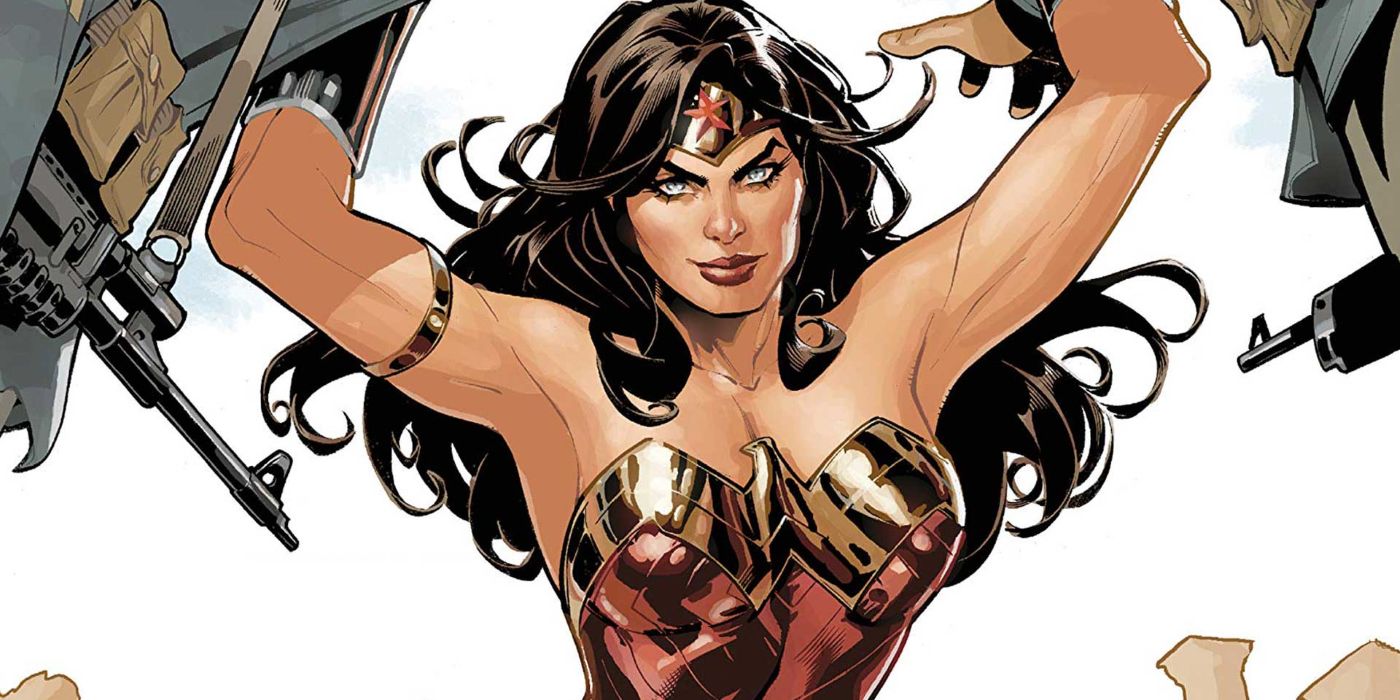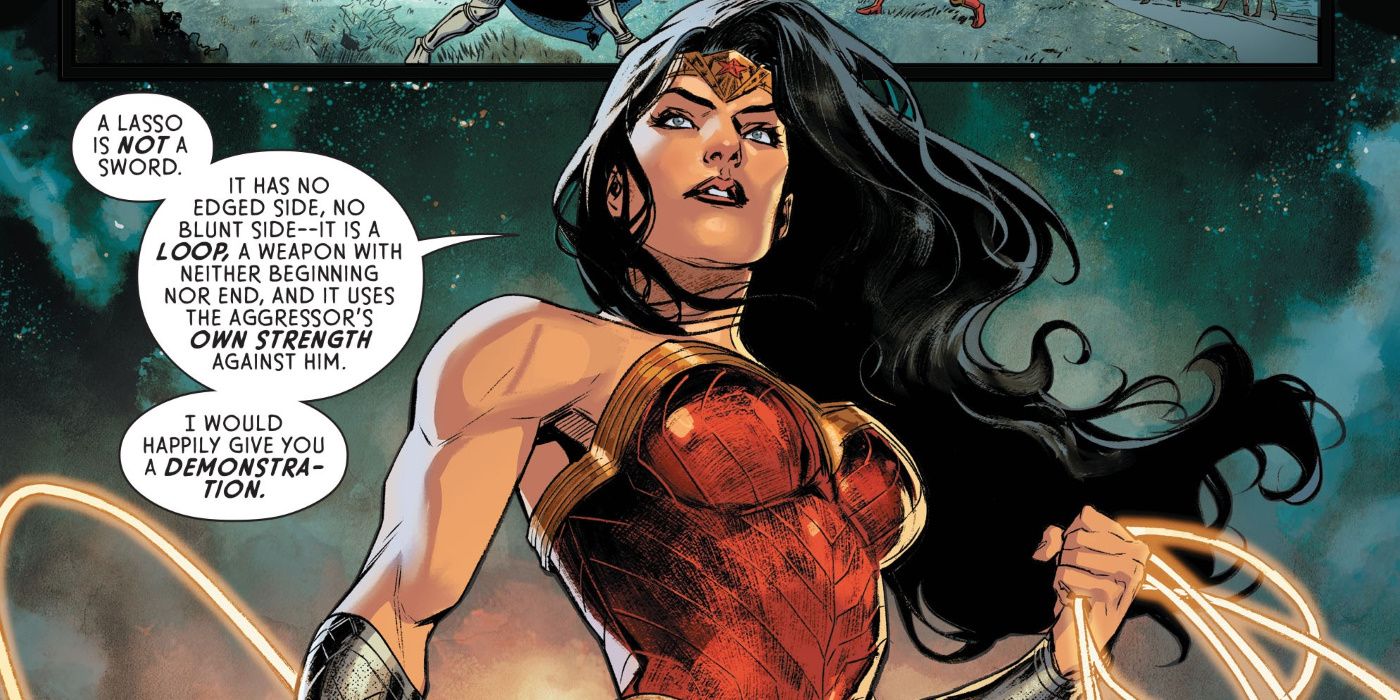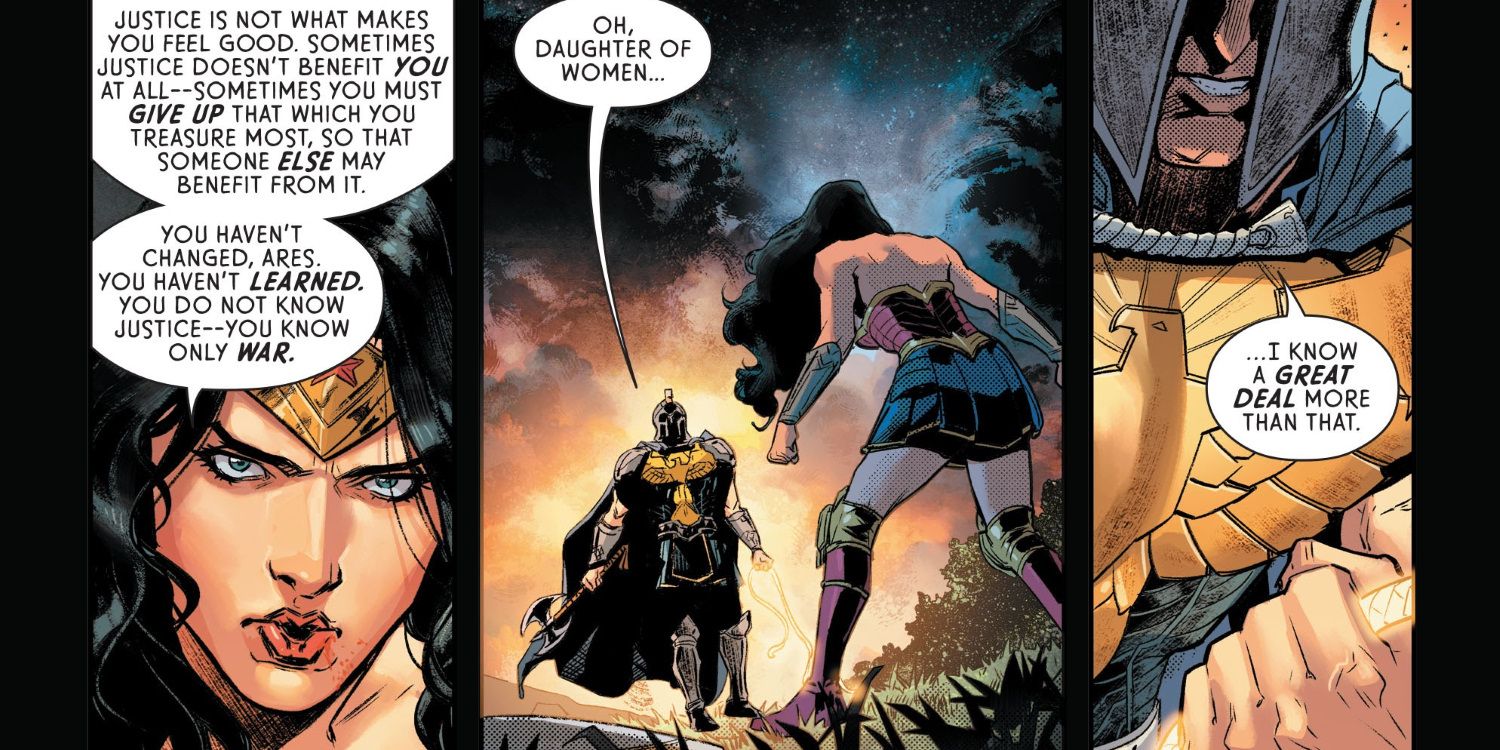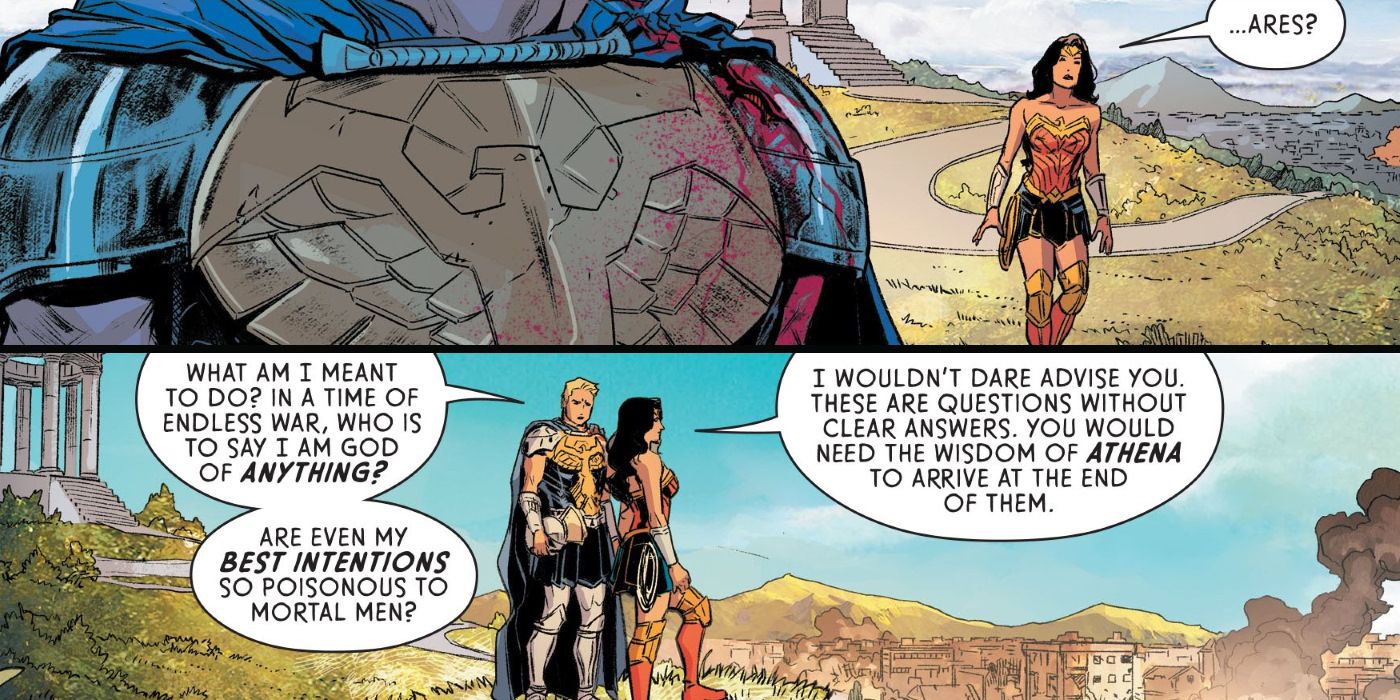When DC Comics announced G. Willow Wilson would be writing Wonder Woman, fans knew it wouldn't pull any punches. The result was a story now collected as Wonder Woman: The Just War, beginning with the rebirth of Ares as a heroic god and sending Diana into an Easter European civil war.
With no supervillain to blame for the conflict, and no solution to be bought with sacrifice, civility, or combat, The Just War raises serious questions about the modern nature of war, and Diana's ability to oppose it with love and justice alone.With issues #58-65 now collected in Wonder Woman Vol. 1: The Just War, Screen Rant got the chance to speak with Wilson about her ending run with Diana of Themyscira, the message she hopes fans will take from the tale, and how Wonder Woman can still provide an example worth following in a world where 'love' is no longer enough.
You certainly didn't start slow when given the chance to write Wonder Woman, having her fly straight into a modern war, in a modern world, with one side of the conflict demanding statehood. Then asking the question: what does justice look like in this scenario? That seems about as timely a story as you could possibly tell right now. Did you know that was exactly how you wanted to start?
Actually no. You know, I had to think about it for quite a while. Because I think when you get a chance to write a character like Wonder Woman, who has such a long history and so many fans across the world, and who has been written by so many of the great artists and writers of modern superhero comics, there are a lot of things to take into consideration. You want to do justice to the stories that have been told before, and the characters that have been developed over the course of the decades. But at the same time, make room for new readers who might be familiar with the character but not with the comic book. And make it relevant, but also pull in secondary characters who fans have loved for years. And as it turns out, that’s a really tall order! I had to kind of sit with it for a while and figure out how to mesh all of those different elements, and get to a story that supported all of those.
So I really didn’t go in with one particular objective in mind. I kind of went back and I read my favorite Wonder Woman runs and I thought about them for a while and said, 'Okay, do I have anything to add to this?' Because there have been such great story telling moments in Wonder Woman over the years, and I had serious imposter syndrome thinking like, 'Can I really add anything to what's already been said?' So yeah, it really took a while. It took several weeks of me kind of outlining, and tossing things and saying. 'No, I can’t do that,' and coming back. And wanting to strike a balance that was timely, but not so heavy that it was just a slog to read. Which is why I brought in the comic relief in the form of that almost literal Greek chorus of mythical creatures. Quite literally a Greek chorus, who kind of lighten the tone a little bit. But yeah, it took quite a while to get there.
I know that when you use a modern story, and a modern type of crisis, there is obviously an apprehension to have Diana 'solve' it.
Exactly. Yes. Yes.
It seems funny, especially with so many superhero movies and TV shows, and the complaints people make about dark, or morally grey stories. They like superhero stories that are a bit simpler: right and wrong, good vs evil. The Just War is very clearly disagreeing with that idea. I was turning the pages and thinking, 'Boy I really hope Diana knows what the right thing is to do here'--
Because I sure as heck don't! Yeah.
She ends up arriving at an answer, but was this a case of you working at a problem you don't feel there is an answer to?
Well, what I was trying to do was put Diana in a situation where there was no clear way to use her powers to fix things. I think the real challenge of a character like Wonder Woman is that it is easy to make her too perfect. Because she not only has super strength and speed and these mythical weapons, she’s really smart, she’s beautiful, she comes from this very idyllic society, she has a strong sense of justice. It almost becomes difficult to tell a story about a character who is so unflawed.
I thought what might be called for is to put her in a situation where those powers are no use to her, because it is so complex that she, number one, can’t simply punch her way out and fix things that way. But also that she knows by putting her finger on the scales, she is potentially upending--if she makes the wrong call, hundreds of thousands of people’s lives are going to be affected. That weighs very heavily on her because she does have such a profound sense of justice. So it was interesting to put her in that sort of situation where there is no obvious way out and I’m trying to kind of muddle through with her and put us, the reader, in a situation where we are seeing through her point of view as an outsider. Not just in this conflict but in all world conflicts because this is not her home. So it was an interesting challenge to put in her path.
I want to cheat and ask 'what you were trying to say,' but it's clear enough that Wonder Woman is defined as the hero who loves, who wants peace and not war... But this story shows that in a modern world, it isn't that simple. Wonder Woman wanting to love everyone involved is not going to make this better. Someone could look at that and think it is a bleak view, or that the world has changed beyond a figure like Diana being able to solve it.
Yeah. I mean that could sort of sum up the entire run, 'it’s not that simple anymore' [Laughs]. I think we’re living in such an interesting time. I think when people are coming to realize that the issues that we face, we have to face collectively. It’s not as simple as, 'Well if we could just have the right person in the right place, that one person could fix everything.' So it’s a really interesting time to be writing superhero comics. When we’re at a point of almost superhero skepticism I think. Where we love these characters, I mean my gosh, walk into any movie theater and you’ll see how much we love them. That, by that same token, I think there’s more acknowledgment that the problems that we face, whether it’s climate change, economic inequality, name something, is not something that can be fixed by one person. Even if that one person is the most benevolent, strong, smart individual that we can kind of conjure.
That makes writing a superhero comic, especially one like this, I think a very unique challenge. Because how does one individual respond to a situation where there is not one obvious neat/tidy solution that can be enacted by a single individual? So yeah, I don’t know if I would necessarily call it bleak because ultimately the issues that are faced in the first arc, 'The Just War' do have a kind of pathway through them, but it takes a collocation of people to fix it. And Diana, in a sense, is not rushing in to kill one bad guy with one sword. She’s a facilitator. She facilitates that conversation between those two groups of people. So finding that role for her was important for me, because of course you don’t want to say like, 'Death and nihilism, and you can’t do anything so you might as well sit it all out.' It's rethinking what the role of a superhero is in a situation where the problems are too large to be solved by one person.
By the end of the story it does feel like Diana has learned something, even if it is a hard truth. So for yourself, having written Wonder Woman, one of the original superheroes, does that influence your thinking as a writer? Either in your mental image of Diana, or how you approach a character? Do you understand HER better?
I’d like to think that I do understand her better than I did before. I have to say, it took me a while to be able to get to a point where I could hear her voice in my head. I think that’s critical when you’re doing a solo book, where you’re spending most of your time in the head of that main character. You have to get their inner monologue right. And that was tough! I think coming from a background where I’d spent five years writing a YA superhero who’s going through very familiar problems, of growing up and peer pressure in school, and trying to juggle all of these different things. Those are things that we’ve all been through and we can all relate to. But none among us have had the experience of growing up among the Amazons, you know, and having mythical weapons and sort of coming to Earth as a demigod. That’s not an ordinary human experience. So getting to the point where I can hear her, where her voice was something that I could carry around with me, and I could kind of summon up when I was writing the dialogue took a minute.
It gives me a new appreciation and respect for those very first golden age superheroes, who are quite different from us. You know, they’re not the Spider-Man archetype; they’re not the everyman archetype. They are the last of their civilization, if it’s Superman. Or they are the daughter of this line of demigods, isolated here on our Earth and unable to get back to this perfect society in which they grew up. They really are more like gods than human beings, and getting into that mindset is quite tough. So yeah, I definitely have a new respect and appreciation for just how much work goes into making characters like that believable.
Wonder Woman Vol. 1: The Just War collecting Issue #58-65 is available now in trade paperback at your local comic book shop, bookstore, or direct from DC Comics.




